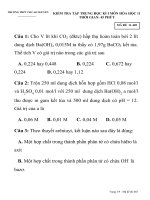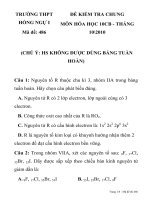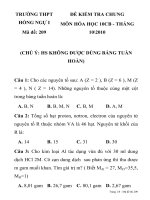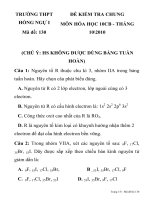BỘ ĐỀ THỨ 2 (Trường THPT Hồng Ngự 2) ppt
Bạn đang xem bản rút gọn của tài liệu. Xem và tải ngay bản đầy đủ của tài liệu tại đây (63.87 KB, 4 trang )
BỘ ĐỀ THỨ 2
(Trường THPT Hồng Ngự 2)
I. PRONUNCIATION :
A. PHONETICS : Pick out the word which has the underlined part pronounced
differently from the rest
1. A. vapour B. age C. carry D. case
2. A. oxygen B. supply C. healthy D. slowly
3. A. amount B. count C. mountain D. course
B. ACCENTS : Pick out the word which has the main tressed syllable differently from
the rest
4. A. atmosphere B. emission C. combine D. comedian
5. A. influence B. pollen C. popular D. conservation
II. VOCABULARY AND EXPRESSION : Choose the most suitable word or phrase
6. “Interpol” is combined from the two words ____________ .
A. internet and pole B. internet and police
C. international and pole D. international and police
7. Coal, oil and forests are the most important __________ resources.
A. industrial B. agricultural C. natural D. national
8. Mrs.Pike has been told by her doctor that she is _________, she canot have a
child of her own.
A. childless B. childhood C. childish D. child
9. SO
2
is the fomular of ___________ .
A. carbon dioxide B. sulphur dioxide
C. nitrogen dioxide D. carbonic acid
10. He is such _______ interested man that everybody likes him.
A. a B. an C. the D. no article
11. Pay attention _________ all the traffic sign when you are travelling in the street.
A. of B. to C. for D. with
12. Now we are still looking for the ________ to the problem of traffic accidents.
A. solve B. solver C. solution D. solvable
13. The prefix of “pleasant” is ______________.
A. im- B. in- C. ir- D. un-
14. Hunting for meat and burning forests for soil ________ wildlife.
A. conserve B. protect C. destroy D. devote
15. The authority is trying to put an end to the rebel.
A. put down B. put up C. stop D. A and C
16. The government invested a great deal of money in irrigation to protect fields _______
droughts.
A. out B. about C. from D. off
17. Everything was __________ when I was interviewed.
A. busy B. high C. slow D. smooth
III.GRAMMAR AND STRUCTURE :
A. Choose the best word or phrase
18. My father used to ________ me to the zoo when we ________ in the city.
A. took / had lived B. taking / were living
C. take / lived D. taking / were living
19. They had ever considered __________, but they change their mind later.
A. not to go B. not going C. not go D. do not go
20. You used to throw waste paper away, _________ ?
A. didn’t you B. wouldn’t you C. did you D. hadn’t you
21. Does the applicant ___________ ?
A. know how to use computer B. know computing
C. know to computing D. know how computing
20. Dr. Fleming, _________ discovered penicillin, was awarded the Nobel Prize
of Medicine in 1945.
A. who B. whom C. that D. which
22. I could not sleep last night __________ I was very tired.
A. although B. but C. if D. A and C
23. Both Mary and Jane, as well as John, _______ ready for the examination tomorrow.
A. is B. was C. are D. are to
24. She is late again. There is nothing to do but __________ .
A. to wait B. wait C. waited D. waiting
25. Not only _________ air polluton but it is also does harm to our health.
A. car exhaust cause B. car exhaust causes
C. does car exhaust cause D. do car exhaust cause
26. Many people have a habit of smoking after lunch.
A. used to B. are used to C. used D. are accustomed to
27. Peter has spent _________ time and money on stamp collection.
A. a few of B. many of C. a large number ofD. a great deal of
28. “Daisy had a careful look at the pictures on the wall.” means ________________ .
A. Daisy looked at the pictures on the wall carefully
B. Daisy took a care look at the pictures on the wall
C. Daisy is carefully looking at the pictures on the wall
D. Daisy looked careful at the pictures on the wall
29. It is raining heavily outside. You had better _________ at home.
A. to saty B. have stayed C. was staying D. stay
30. Mary said, “I have not seen Peter since last month.”
A. Mary said she has not seen Peter since the previous month.
B. Mary said she had not seen Peter since the previous month.
C. Mary said she was not seen Peter since the previous month.
D. Mary said she does not see Peter since the previous month.
B. Identify the one underlined word or phrase that must be changed in order to make
the sentence correct :
31. Many of the world’s air, water, and land is now partially poisoned.
A B C D
32. The little boy is very interested in football, but he is actually not good for playing.
A B C D
33. What would you have do if you were in my position ?
A B C D
34. After to invent dynamite, Alfred Nobel became rich, but when he saw its universally
A B C
destructive power, he was very sorry about his invention.
D
35. If he had knew the time when the match started, I would have told you.
A B C D
IV. READING COMPREHENSION :
A. Read the text carefully and then choose the correct answer :
More than two hundred years ago, the term “environment pollution” is quite strage to
people. They live healthily, drank pure water, and bearthed fresh air. In those days,
industry was not well-develpoed. Nowadays, the situation is quite different. The world
today is faced with amny major threats. The most dangerous threat of all is war, and after
the threat of war is pollution. People all over the world are worried about things that are
happening to the environment. Actuall, it is amn that is destroying the surroundings with
amny kinds of wastes from the devices that make human lives more comfortable an
dconvenient. Everyboby knows that cars emit dangerous gases that cause poisonous air
and cancer, but no one want to travel on foot or by bicycles. Manufacturers know that
wastes from factories make water and soil polluted, but they do not want to spend a lot of
their money on treating wastes safely. Scattering rubbish is bad for our health, but no one
wants to spend time burying it. Is it worth talking a lot about polluttion ?
36. More than two hundred years ago ____________________ .
A. the environment was polluted as much as it today.
B. people knew nothing about environmental polluttion.
C. air was polluted badly
D. people were faced with pollution
37. In former days, people __________________________ .
A. bearthed fresh air, drank pure water and lived healthily
B. bearthed polutted air, drank pure water and lived healthily
C. lived in the polutted environment
D. were worried about pollution
38. The most dangerous threat that the world is faced with is _______________ .
A. polllution B. water C. war D. air
39. Everyboby knows that cars emit dangerous gases _____________________.
A. so they do not travel by car any longer
B. so they prefer travelling by bicycles
C. but they still prefer travelling by cars
D. they no longer use cars
40. Factory owners _____________________ .
A. know nothing about pollution
B. have no awareness of pollution
C. treat wastes from their factories safely
D. do not want spend money on treating the wastes safely
B. Fill in each numbered blank with one suitable word :
Several famous people are left-handed, (41) ________ Julius Caesar, Napoleon, and Albert
Einstein. Queen Victoria of Engliand was also left-handed, (42) ________ Prtince
Charles. Paul Mc Cartney of the Beatles plays (43) _________ guitar the opposite way
from other guitarsists because he is left-handed. Marilyn Monroe, the famous America star
was also a leftie. Are you a leftie (44) _________you write with your right hand ? To
understand (45) _________ it is necessary to look at the brain. The brain is (46)
__________ into two hemispheres. The left hemisphere of the brain (47) __________ the
right side of the body, and the right hemisphere controls the left side. Both of the sides of
the body receive the same information (48) _________ the brain because the two
hemispheres are connected. (49) __________, in the right-handed people, the left
hemisphere is stronger. In the left-handed people, it is the right hemisphere (50)
_________ is stronger.
41.A. such as B. so as C. so that D. such that
42. is so and B. and too is C. and so is D. and is so
43. a B. an C. the D. no article
44. as B. because C. even D. even though
45. leftie B. left-handed C. lefthander D. lefthandedness
46. divided B. cut C. subtracted D. seperated
47. conquers B. controls C. contrasts D. consists
48. on B. to C. from D. for
49. in order that B. therefore C. never D. however
50. who B. whom C. that D. where









